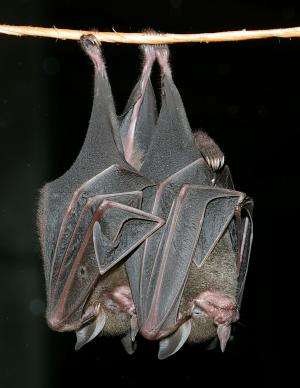Light pollution impairs rainforest regeneration

Increasing light pollution in tropical habitats could be hampering regeneration of rainforests because of its impact on nocturnal fruit-eating bats.
These new findings were reported by scientists from the German Leibniz Institute for Zoo and Wildlife Research Berlin (IZW). The study – published in the British Ecological Society's Journal of Applied Ecology – is the first to show that seed-dispersing bats avoid feeding in light-polluted areas.
Working in Costa Rica with Sowell's short-tailed bats (Carollia sowelli), Daniel Lewanzik from the IZW gave the bats a simple choice. He divided a flight cage into two compartments. One was naturally dark and the other was illuminated by a sodium street lamp, the most common form of street lighting in the world. Inside both parts of the cage the bats were offered their favourite fruits to harvest: pepper plants, nightshade and figs.
The results revealed that bats flew into the dark compartment twice as often as the compartment lit by a street lamp. The bats also harvested fruits almost twice as often in the dark compartment.
In a second experiment Lewanzik illuminated pepper plants growing in the wild with a street light and measured the percentage of ripe fruit which bats harvested from plants in a dark location and from lit plants. While bats harvested 100 per cent of the marked, ripe fruit from the plants in the dark, only 78 per cent were taken from the lit plants.
Although insect-eating bats have been shown to avoid foraging in light-polluted areas, this is the first study to show that fruit-eating bats also avoid lit areas.
This has important implications for forest regeneration in the tropics. Bats play a key role in pollinating plants and spreading their seeds, especially the seeds of species that are first to recolonise cleared land. "In tropical habitats bat-mediated seed dispersal is necessary for the rapid succession of deforested land because few other animals than bats disperse seeds into open habitats," says Daniel Lewanzik, a PhD student at the IZW and first author of the study.
Under naturally dark conditions, bats produce a copious 'seed rain' when defecating seeds while flying. By reducing foraging of fruit-eating bats in lit areas, light pollution is likely to reduce seed rain.
In many tropical countries, light pollution is increasing rapidly as economies and human populations grow. Natural succession of forests could therefore suffer as tropical habitats become increasingly illuminated. "The impact of light pollution could be reduced by changes in lighting design and by setting up dark refuges connected by dark corridors for light-sensitive species like bats," Lewanzik says.
More information: Lewanzik D, Voigt CC (2014): Artificial light puts ecosystem services of frugivorous bats at risk. Journal of Applied Ecology. DOI: 10.1111/1365-2664.12206
Journal information: Journal of Applied Ecology
Provided by Wiley


















